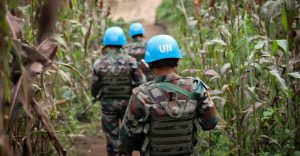
UN Peacekeepers Photo: UN
On September 29th this year the news broke that more than 50 women accused aid workers for sexual abuse in the Congo Ebola crisis response efforts during 2018-2020. It was the nonprofit news organization The New Humanitarian that after a yearlong investigation into the matter released their findings. The claims that were put forward accused unnamed male workers from mainly the WHO, but also other leading NGOs and UN agencies as well as the Congolese health ministry, for demanding sex in change for employment. Women shared stories of being pressured to have sexual relations with men to be considered for employment and of contracts being terminated when refusing to engage with the men. The practice was so widely spread that it became known as a “passport to employment” ¹.
After the revelation’s condemnations from several of the concerned organizations followed and WHO, among others, vowed to investigate the claims thoroughly. Many of the NGOs also claimed to have received few or no reports on sexual abuse during the Ebola crisis response ².
“large scale sexual misconduct in the aid industry was put forward”
It was not the first time that allegations of large scale sexual misconduct in the aid industry was put forward, far from it. Without going too far back in history one can mention Bosnia in the nineties where UN peacekeepers involvement in a sex trafficking ring was exposed and in 2002 reports came out revealing that staff from over 40 aid agencies in west Africa had been involved in sexual exploitation of refugee children, demanding sexual favors in change of food rations or other aid services. The list goes on with UN peacekeepers in Haiti (2004-2017), the Central African Republic (2013-2015) and the Democratic Republic of Congo (2017) being accused of horrific sexual exploitation of women and children.
These accounts reveal horrific and widespread sexual abuse and abuse of power that cannot be rationalized as isolated events or explained as the wrong doings of certain individuals. They reveal something much larger than that, something systemic. They reveal a culture of acceptance and a tradition of looking the other way when faced with signals and reports of sexual misconduct (as an example can be mentioned that the staffer that blew the whistle on the sex trafficking scandal in Bosnia initially lost her job on claims that was later found to be unfounded in court). They reveal a staggering lack of control systems to ensure that people sent out to serve are fit for service and a disposition not to demand accountability from perpetrators.
In October 2018 the UK government hosted the Safeguard Summit 2018, a conference (which could be attended online) initiated with the aim to tackle sexual exploitation, sexual abuse and sexual harassment in the aid sector. The goal was to drive collective action and prevent and respond to sexual abuse in the aid sector. Invited participants where, amongst others, representatives from NGOs, governments, survivors and victims, independent experts and law enforcement agencies. At the summit a joint initiative between the UK Department for International Development (DFID), Interpol and the UK Criminal records office was presented: Project Soteria, an online platform to work as a tool improve criminal records checks and facilitate information sharing between law enforcement agencies ³.
Both the summit and the project was widely criticized. The summit was criticized for being careless and offensive and more about the DFIDs public image. The activist Paula Donovan declined to participate and wrote a statement concluding that “The pain and suffering of survivors should never be exploited by powerful institutions for public relations or damage control purposes”. The summit was also criticized for lack of inclusion based on the absence of non-white voices and experiences in the speaker list. Many participants questioned the efficacy of the proposed Project Soteria as, in their experience, the majority of the sexual abuse cases are never reported and most of the cases of sexual misconduct do not result in criminal conviction. It is much more common that the perpetrator is fired or resigns, and the investigations carried out are inconclusive and do not lead to prosecution. Therefore, a data base of convicted perpetrators would not alert for sexual predators.
“we don’t need new technology, we need systemic change”
Alexia Pepper De Caires, a former Save the Children employee and founder of the NGO Safe Space, objected to the project with the statement that we don’t need new technology, we need systemic change and to understand issues of “sexism, racism, and abuse of power.” ⁴
I think she makes an excellent point. We cannot fight sexual exploitation, structural abuse of power or misogyny with ICT and technical solutions alone. Sure, ICT can be a tool to bring awareness and promote behaviors, but we should not rely too heavily on it to fix the core issues. We need to understand the underlying structures and the mechanisms that allow it to happen over and over again. Victims and survivors need to be put front and center and we need to embrace a culture where calling out sexual abuse, racism and misogyny is not only accepted but encouraged.
References
- https://www.thenewhumanitarian.org/2020/09/29/exclusive-more-50-women-accuse-aid-workers-sex-abuse-congo-ebola-crisis
- https://www.who.int/news-room/detail/29-09-2020-who-to-investigate-allegations-of-sexual-exploitation-and-abuse-in-ebola-response-in-the-democratic-republic-of-the-congo
- https://www.gov.uk/government/topical-events/safeguarding-summit-2018
- https://www.thenewhumanitarian.org/news-feature/2018/10/18/safeguarding-aid-sector-sex-abuse-shaky-start





